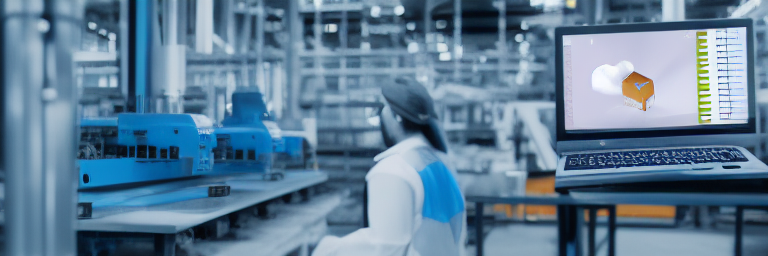Machine Learning (ML) in Manufaturing
Machine Learning in manufacturing is the use of algorithms to predict performance, detect anomalies, and optimize production processes. ML algorithms can be used to analyze large amounts of data to identify patterns and trends, allowing manufacturers to identify potential problems before they occur. By using Machine Learning, manufacturers can optimize production processes, increase efficiency, reduce costs, and improve safety.
Machine Learning (ML) is quickly becoming a valuable tool for manufacturers. By leveraging powerful algorithms and predictive analytics, Machine Learning can help identify patterns, detect abnormalities, and even predict the future. Also, this technology is being used to monitor the performance of industrial equipment and processes, optimize supply chains, and even reduce downtime.
One of the most promising applications of Machine Learning in manufacturing is predictive maintenance. By using algorithms to identify patterns in data from sensors, Machine Learning can predict when machinery is likely to fail before it does. This can help reduce unplanned outages and save money in the long run.
Another application of Machine Learning in manufacturing is quality control. By utilizing advanced analytics, Machine Learning can help identify and analyze defects in products. As well, this can help manufacturers improve their quality control processes and ensure that products meet customer expectations.
Finally, Machine Learning is being used to optimize production processes. Too, by monitoring factory operations and analyzing data, ML can help identify bottlenecks and suggest improvements. This can help manufacturers reduce waste, increase efficiency, and reduce costs.
Overall, machine learning is quickly becoming an indispensable tool for manufacturers. By leveraging powerful algorithms and predictive analytics, ML can help optimize production processes, reduce downtime, improve quality control, and predict failure. As well, as the technology advances, the potential applications in manufacturing will only continue to grow.
Application Examples
Machine Learning is being increasingly used in manufacturing to increase efficiency and reduce costs. Examples of its applications include predictive maintenance, process optimization, robotic process automation (RPA) and quality control.
- Predictive maintenance is the use of Machine Learning algorithms to monitor and analyze machine data in order to predict when a machine will fail. This allows manufacturers to schedule maintenance before a breakdown occurs, reducing downtime and saving money.
- Process optimization uses Machine Learning to analyze data from a manufacturing process and identify areas where it can be improved. By reducing waste, increasing throughput and improving quality, this can result in significant cost savings.
- Robotic process automation (RPA) is the use of robots to automate manual, repetitive tasks. Machine Learning algorithms can be used to train robots to perform these tasks more accurately and quickly than humans, increasing efficiency and reducing costs.
- Quality control, by analyzing data from the production process, it can identify flaws and defects in products, allowing them to be identified and corrected before they reach customers. This can reduce the number of customer returns and improve customer satisfaction.
Advantages and Challenges
Advantages:
Machine Learning has the potential to revolutionize manufacturing processes and increase efficiency. Too, it can be used to develop predictive models for scheduling, supply chain management, and demand forecasting. Additionally, ML can be used to optimize production processes, reduce cycle times and improve quality control.
Challenges:
The implementation of machine learning in manufacturing can be a challenge due to the need to collect and interpret large amounts of data. Additionally, there can be a lack of understanding of ML algorithms, as well as potential problems with data accuracy. Finally, there is also the potential for security and privacy issues when implementing it into manufacturing processes.
Considerations
Machine learning has become increasingly popular in the manufacturing industry in recent years. Manufacturers are now using this technology to improve their production methods, reduce costs, and increase efficiency. ML can be used in a variety of ways in manufacturing, from improving predictive maintenance and quality control to streamlining production processes.
When considering using ML in manufacturing, there are several important considerations to keep in mind. First, it is important to ensure that the data used to train the machine learning model is accurate, reliable, and up to date. This data must also be relevant to the problem at hand. Additionally, it is important to consider the security of the data as it could contain sensitive information about the company or its customers.
Next, it is essential to have a clear understanding of the objectives for the ML project. This will help determine which machine learning algorithms and technologies should be used to achieve the desired outcome. It is also important to consider the computational resources required for the project; for example, more complex models may require more powerful hardware.
Finally, when implementing ML in manufacturing, it is important to consider the potential impact it may have on the workforce. For example, some tasks may be automated and replaced by the machine learning model, leading to job losses. Additionally, workers may need additional training to be able to operate and maintain the machine learning system. It is important to ensure that workers’ rights are respected and that they are not adversely affected by the use of ML.
The Future Outlook
Machine Learning has already had a huge impact on manufacturing and is expected to continue to do so in the future. ML algorithms can be used to automate processes, such as product inspections and quality control, allowing for increased efficiency and better quality products. Additionally, it can be used to help manufacturers predict and plan for customer demand, allowing them to optimize their production process. Moving forward, it is expected to play an even larger role in manufacturing, with the potential to enable autonomous and intelligent systems that can make decisions and take actions without human intervention.

